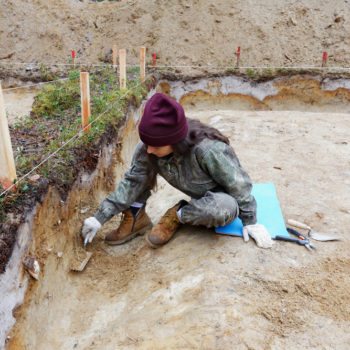Why We Love It
-
$64,290Potential Avg. Salary
-
3.9%Job Growth Rate
-
Growing DemandJob Outlook
-
InvestigativeCareer Attribute
Anthropologists are researchers who study human culture and behavior. Unlike individuals in other social science fields, anthropologists are not as concerned with what happens as they are with why it happens. Their role is one of scientific investigation, historical relevance, and psychological evaluation.
Recommended Schools
What is an Anthropologist?
The following job responsibilities are common for individuals in anthropologist roles:
- Conduct ethnographic research through participant-observation—immersion into another culture to form a better understanding of the practices of that culture
- Excavate bones and items from historical sites to form a better understanding of historical cultures
- Form theories on the causes of issues that plague the world—such as hunger, disease, and poverty—in order to make recommendations as to how to resolve or reduce the impact of these problems
- Study the evolution of humans and other animals
- Analyze languages, their history, how they’re related, and how they’ve changed over time as a basis for better understanding cultures and interactions
A Day in the Life
Anthropologists are researchers who study human culture and behavior. Their research can be conducted in numerous ways, so there are several specialties within anthropology. While these specialties all take different approaches, they’re all concerned with understanding why certain things happen and why people behave the way they do. Where historians are concerned with what specific things happened over time, anthropologists look into why they happened. They also use the principles of psychology to identify motives, but they do not seek to treat people—only observe them.
Anthropologists can seek to understands humans and cultures through a variety of sources. Some are ethnographers who immerse themselves into very different cultures and live with diverse groups for a year or more at a time in order to better understand their behaviors and decisions. Some are linguists who study language to determine how different cultures are connected and why they diverged and formed new dialects or languages. Some are archaeologists who excavate and analyze bones and objects from historical sites.
However anthropologists go about conducting their research, their goal is always to use the knowledge they gain to provide a better understanding of why things happen or happened. For example, when AIDS became an epidemic, scientists studied what caused it, and anthropologists studied why the disease became an epidemic. This knowledge allows them to make recommendations to improve conditions—such as implementing STD education in middle and high schools. This is just one example of how the work performed by anthropologists is used to benefit society overall.
Typical Work Schedule
The work schedule for anthropologists varies greatly. Many anthropologists work full-time during normal business hours. Others—especially ethnographers and archaeologists—travel frequently and may work long hours, evening, and weekends.
Anthropologist Specializations
- Archaeologists excavate and study bones and items that belonged to historical cultures and societies to gain a better understanding of those societies.
- Biological anthropologists study human evolution and diseases—how and why biology impacts cultures and society.
- Ethnographers conduct research through participant-observation—immersing themselves into other cultures to form a better understanding of the practices and beliefs of that culture.
- Linguistic anthropologists study language—how it’s used by different cultures, and how it’s changed across history—to form cultural observations.
Typical Employers
Anthropologists work for employers in many different industries, including research and development, consulting, government, and engineering.
Recommended Schools
How To Become an Anthropologist
The first step in becoming an anthropologist is to earn a bachelor’s degree. Common majors include anthropology, archaeology, languages (English, Spanish, French, etc.), and sociology. If you know going in to college exactly what specialty of anthropology you want to work in—for example, linguistic anthropologists commonly study a language as an undergraduate—choose a major suited to that career; otherwise, a general archaeology degree will provide a sufficient education.
With a bachelor’s degree, you’ll qualify for entry-level positions in the field of anthropology. You may be able to find internships or assistant positions that will allow you to start building professional experience. However, to qualify for more advanced roles, you’ll need to pursue a master’s degree. Again, the master’s degree you earn may need to be catered to the job you hope to find. Aspiring archaeologists commonly pursue archaeology degrees, and aspiring linguistic anthropologists commonly pursue master’s degrees in linguistics. General anthropology master’s degrees are also common.
Anthropologists with a master’s degree and experience in the field commonly qualify for mid-level positions as anthropologists. However, senior-level positions often require a Ph.D. A Ph.D. is commonly required for ethnographers who plan to research cultures in foreign countries, and is required for anthropologists who want to teach anthropology at the college level.
Anthropologist Salary Data
We’ve provided you the following to learn more about this career. The salary and growth data on this page comes from recently published Bureau of Labor Statistics data while the recommendations and editorial content are based on our research.
National Anual Salary
Low Range
$45,520Average
$64,290High Range
$97,040National Hourly Wage
Low Range
$22/hrAverage
$31/hrHigh Range
$47/hrHow do Anthropologist salaries stack up to other jobs across the country? Based on the latest jobs data nationwide, Anthropologist's can make an average annual salary of $64,290, or $31 per hour. On the lower end, they can make $45,520 or $22 per hour, perhaps when just starting out or based on the state you live in.
Salary Rankings And Facts
#236 Nationally for All Careers
Above Average Salary Nationally
Programs and Degrees
Here are the most common degrees for becoming an Anthropologist. a is usually recommended and specifically a degree or coursework that prepares you for the particular field, see below.
Highest Education Among Anthropologists
- 17% Doctorate
- 37% Masters
- 36.8% Bachelors
- 3.9% Associates
- 4.8% College
- 0.3% High School
- 0.2% Less than High School
Job Growth Projections and Forecast
2014 Total Jobs
7,7002024 Est. Jobs
8,000Job Growth Rate
3.9%Est. New Jobs
300How does Anthropologist job growth stack up to other jobs across the country? By 2024, there will be a change of 300 jobs for a total of 8,000 people employed in the career nationwide. This is a 3.9% change in growth over the next ten years, giving the career a growth rate nationwide of Above Average.
Growth Rankings And Facts
#484 Nationally for All Careers
Above Avg. Growth Nationally
What Companies Employ The Most Anthropologists
| Industry | Current Jobs | New Jobs Needed | % Increase |
|---|---|---|---|
| Research and development in the social sciences and humanities | 2,100 | -200 | 0% |
| Management, scientific, and technical consulting services | 1,800 | 400 | 1% |
| Federal government, excluding postal service | 1,400 | -100 | 0% |
Similar Careers
-
Hospital Social Worker
-
Anger Management Therapist
-
Industrial Organizational Psychologist (IO)
-
Vocational Psychologist
-
Clinical Psychologist
-
Marriage and Family Therapist (MFT)
-
Speech Language Pathology Assistant (SLPA)
-
Behavior Analyst
-
Medical Social Worker
-
Clinical Social Worker
-
Sexual Abuse Therapist
-
Correctional Counselor

















